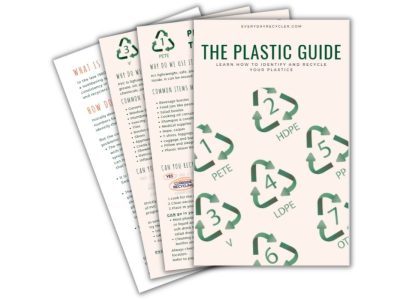Once a staple of home entertainment, VHS tapes have become relics of the past, overtaken by the digital revolution. While these magnetic tapes and plastic cassettes once held cherished memories, movies, and family recordings, the question arises: Are VHS tapes recyclable?
With a stack of old VHS tapes in your garage, you might be wondering, can I throw VHS tapes in the garbage? In this article, we discuss what makes recycling VHS tapes complex and the options for recycling or disposing of them responsibly.
The VHS Era: A Trip Down Memory Lane
Before we explore the recyclability of VHS tapes, let’s take a moment to appreciate the legacy of these iconic cassettes. VHS (Video Home System) tapes reigned supreme as the primary medium for home video entertainment from the late 1970s through the 1990s.
I am a child of the 80s and remember going out to the video store on a Friday to choose 6 movies for $10. But what I really loved was to be able to record my favorite TV shows and movies on blank VHS tapes and build my personal video libraries. Today, it’s hard to imagine this concept in a world where apps stream movies straight to your TV.
The emergence of DVDs, followed by Blu-ray discs, and the transition to digital streaming services marked the gradual demise of VHS. VHS players vanished from electronics stores, and VHS tapes began to gather dust on shelves and in attics.
What Are Video Tapes Made From?
To understand the recyclability of VHS tapes, it’s essential to examine their composition. VHS tapes consist of several components, each with its own environmental implications:
- Plastic Cassette Shell: The outer shell of a VHS tape is typically made from plastic, specifically polypropylene. While plastic recycling is common, VHS cassette shells are often complex and difficult to process in standard recycling facilities.
- Magnetic Tape: The most critical element of a VHS tape is the magnetic tape wound around two spools inside the cassette. This magnetic tape is composed of a thin layer of iron oxide and other materials, including polyester or Mylar film. Recycling this magnetic tape can be challenging due to the mix of materials.
- Paper Labels: Many VHS tapes have paper labels affixed to their cassettes. These labels, if present, can typically be recycled with paper products.
- Foam Pads: Some VHS tapes include foam pads inside the cassette to protect the tape. These foam pads are often not recyclable and should be disposed of properly.
Given the mix of materials in VHS tapes and their complex design, their recyclability is not straightforward. No wonder it’s not always clear if vhs tapes are recyclable.
Are VHS Tapes Recyclable?
VHS tapes are generally not recyclable in the same way that many other common recyclables like paper, glass, or aluminum are. This is because VHS tapes are composed of various materials, including plastic, metal, and magnetic tape, which are difficult to separate and recycle through standard recycling processes.
However, some specialized recycling facilities or e-waste recycling centers may accept VHS tapes for disposal or recycling. In such cases, the tapes are typically disassembled, and their components are processed for recycling or proper disposal.
To determine the best way to handle VHS tapes in your local area, I recommend checking with your local recycling center or waste management facility. They can provide guidance on whether they accept VHS tapes and the specific disposal or recycling options available to you.
VHS Tape Recycling Near Me
How to dispose of your Videotapes:
- Check with your nearest recycling center to see if they accept video tapes for recycling.
- If not check with local e-waste collection services, as many include collection of VHS, CDs, and DVDs.
- Call to check if they accept VHS tapes before you head there.
Oh, and if you want to recycle your old VHS player, your local e-waste collection service is the way to go.
If you’re a business with a large quantity of video tapes you will most likely want to find a local destruction service so you can be sure your information is handled sercurely. There are many of these companies in different states and countries and you should be able to find one through a Google search.
Looking for ways to recycle hard-to-recycle items why not check out Ridwell in the USA or RecycleSmart in Australia.

Repurposing Options for VHS Tapes
While recycling VHS tapes may be challenging, there are creative and environmentally friendly alternatives to consider:
- Art and Craft Projects: VHS tapes can find new life as materials for art and craft projects. The cassette shells, magnetic tape, and labels can be repurposed into sculptures, collages, or mixed media artwork.
- Donations: While the demand for VHS tapes to donate has waned significantly, some organizations, including libraries, schools, and community centers, may still accept donations of VHS tapes for educational or nostalgic purposes.
- Collectibles: VHS tapes to sell include certain rare or collectible VHS tapes, especially those with unique cover art or limited releases, that might hold value among collectors. Consider selling or trading these tapes to enthusiasts who appreciate their vintage appeal.
If repurposing or donating VHS tapes isn’t feasible, it’s crucial to dispose of them properly.
Data Security When Disposing of VHS Tapes
If you are disposing of personal or private VHS tapes, then it’s worth considering disposing of them securely. This is particularly the case if you are a business and have been storing data on VHS cassette tapes. You will want to make sure they are destroyed in a secure way.
Plus, before disposing of your tapes why not look VHS tapes transferred to DVD. That way you can enjoy those home movies for years to come.
CD’s and DVD’s have the same fate as VHS
CDs and DVDs are experiencing a fate reminiscent of VHS tapes as they succumb to the digital era. Just as VHS was overtaken by DVDs and digital streaming, CDs and DVDs are losing ground to the convenience and accessibility of digital downloads and streaming services. With music, movies, and software readily available online, physical discs have become less essential for entertainment and data storage.
The declining demand for CDs and DVDs has led to the closure of many retail stores and a shift in the music and film industries towards digital distribution. This shift reflects the broader trend of consumers favoring digital content over physical media. This gradual obsolescence of CDs and DVDs in today’s fast-paced might have you wondering, can you recycle your old CDs and DVDs?














